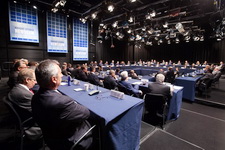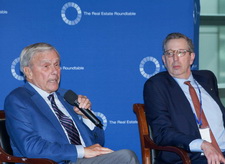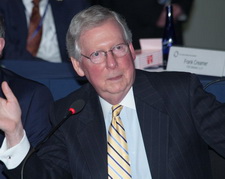Real estate industry and trade association leaders gathered this week with key policymakers in Washington, D.C. for The Roundtable's 2018 Spring Meeting, where major topics of discussion included current market conditions and the economic outlook; the upcoming mid-term elections; infrastructure funding; terrorism risk insurance; immigration reform; and tax reform implementation.
 |
Real estate industry and trade association leaders gathered this week in Washington, D.C. for the Roundtable's 2018 Spring Meeting. |
Roundtable Chair William C. Rudin (CEO & Vice Chairman, Rudin Management Company, Inc.) launched the Spring Roundtable Meeting with a report outlining the Roundtable's policy priorities, such as working closely with the Treasury Department to ensure proper tax reform implementation; Dodd-Frank reform; a more market-oriented terrorism risk insurance program; attracting overseas tourists through the "Visit U.S." coalition; reforming the EB-5 immigrant investor program; and regulatory reforms and streamlining processes for infrastructure modernization.
The Roundtable's business meeting featured the following speakers:
 |
World-renowned journalist and NBC News reporter Tom Brokaw with Roundtable Chair William C. Rudin (CEO & Vice Chairman, Rudin Management Company, Inc. ) . |
World-renowned journalist and NBC News reporter Tom Brokaw spoke to Roundtable members about his lengthy career in Washington and a variety of current events. Brokaw said that while the nation faces issues of gun violence; an ever-evolving digital transformation; challenges of statesmanship; and generational differences, he emphasized the "U.S. is a nation built on big ideas" that is open to positive change – and there must be great leaders willing to be involved in their communities and businesses.
Senate Majority Leader Mitch McConnell's dialogue with Roundtable members focused on the positive aspects of the past 15 months in the Senate, specifically the Tax Cuts and Jobs Act of 2017; confirmation of 12 circuit judges (the most since the 1800s); and 15 regulatory repeals made possible by the Congressional Review Act. Sen McConnell also discussed the electoral landscape for November's mid-term elections; the challenges of raising capital and financing infrastructure projects without having to solely rely on the federal government; and plans to continue to work with the administration on comprehensive immigration reform.
 |
Senate Majority Leader Mitch McConnell (R-KY) |
A common theme echoed throughout the day was the continued need for bipartisanship in the House and Senate. Sen. Chris Coons (D-DE) and Sen. Rob Portman (R-OH) both members of the Senate Foreign Relations Committee, and Ray Washborne, CEO and President of Overseas Private Investment Corporation (OPIC), discussed the recent introduction of The Better Utilization of Investments Leading to Development Act of 2018 (the BUILD Act (S.2463). The legislation is intended to promote sustainable growth in developing economies through U.S. business investment and provide more accountability for taxpayers at no expected cost. The development finance corporation will leverage the U.S. private sector's expertise and investment capital to generate economic growth in the developing world that will support American interests. (Senate Foreign Relations Committee, Feb. 2018)
Julian Enoizi, Chief Executive of Pool Reinsurance Company Limited, who works closely with The Roundtable's Homeland Security Task Force (HSTF) and Real Estate Information Sharing and Analysis Center (RE-ISAC), engaged Roundtable members in discussions regarding the constantly evolving terrorism threat and provided insight into developing a long-term or permanent U.S. reinsurance pooling mechanism for terrorism risk – similar to programs in the United Kingdom and throughout Europe.
After the business meeting, approximately 30 additional policymakers attended a reception and dinner that evening at the Newseum, where real estate CEOs and trade association leaders had the opportunity to further discuss policy issues with lawmakers in an informal setting.
Next on The Roundtable's calendar is the all-member Annual Meeting on June 14-15 at the InterContinental Hotel-The Wharf in Washington, D.C.
Legislative language that could affect the allowable heights of buildings near airports passed the House today (393-13) as part of a bill ( H.R. 4 ) extending authorization of the Federal Aviation Administration (FAA) for five years.
 |
The so-called One Engine Inoperative (OEI) language included in the House-passed FAA bill addresses an Obama-era proposal that could affect land development and property values near U.S. airports. The proposed 2014 policy change would alter decades-old standards by compelling the FAA to consider whether a building or other structure poses a hazard to navigable airspace if a plane engine fails on takeoff. |
The FAA's current funding and revenues are set to expire this September 30. With the House's passage of FAA reauthorization today, the Senate is expected to follow suit and aims to have long-term reauthorization in place by August. ( Roll Call , April 16 and CNN , April 27)
The so-called One Engine Inoperative (OEI) language included in the House-passed FAA bill addresses an Obama-era proposal that could affect land development and property values near U.S. airports. The proposed 2014 policy change would alter decades-old standards by compelling the FAA to consider whether a building or other structure poses a hazard to navigable airspace if a plane engine fails on takeoff.
According to a study of the issue, approximately 4,000 buildings near 380 airports throughout the U.S. could become "non-conforming" if such OEI policies were ever to take effect. The proposed standards would modify take-off and landing flight paths in a manner that restricts allowable building heights and development potential in growth centers and transportation hubs surrounding the nation's airports.
When the FAA proposed the policy change, it explained it was not due to any public safety concerns but rather to allow airlines to carry more passenger and freight cargo. [See technical comment letter submitted July 2014 by The Roundtable and coalition partners].
The language passed by the House would require that any changes to current OEI policies must first go through a full public rulemaking process. Additionally, the White House Office of Management and Budget would be compelled to conduct a full cost-benefit analysis of any such FAA action.
The Roundtable, the National Association of Real Estate Investment Trusts (NAREIT), and other real estate trade groups have long urged Congress to include the OEI rulemaking and cost-benefit language in any FAA reauthorization bill. (Roundtable Weekly, Feb. 12, 2016).
The Roundtable will continue to monitor the Senate's actions on FAA reauthorization and urge inclusion of similar provisions as the legislation now moves to the other side of Capitol Hill.